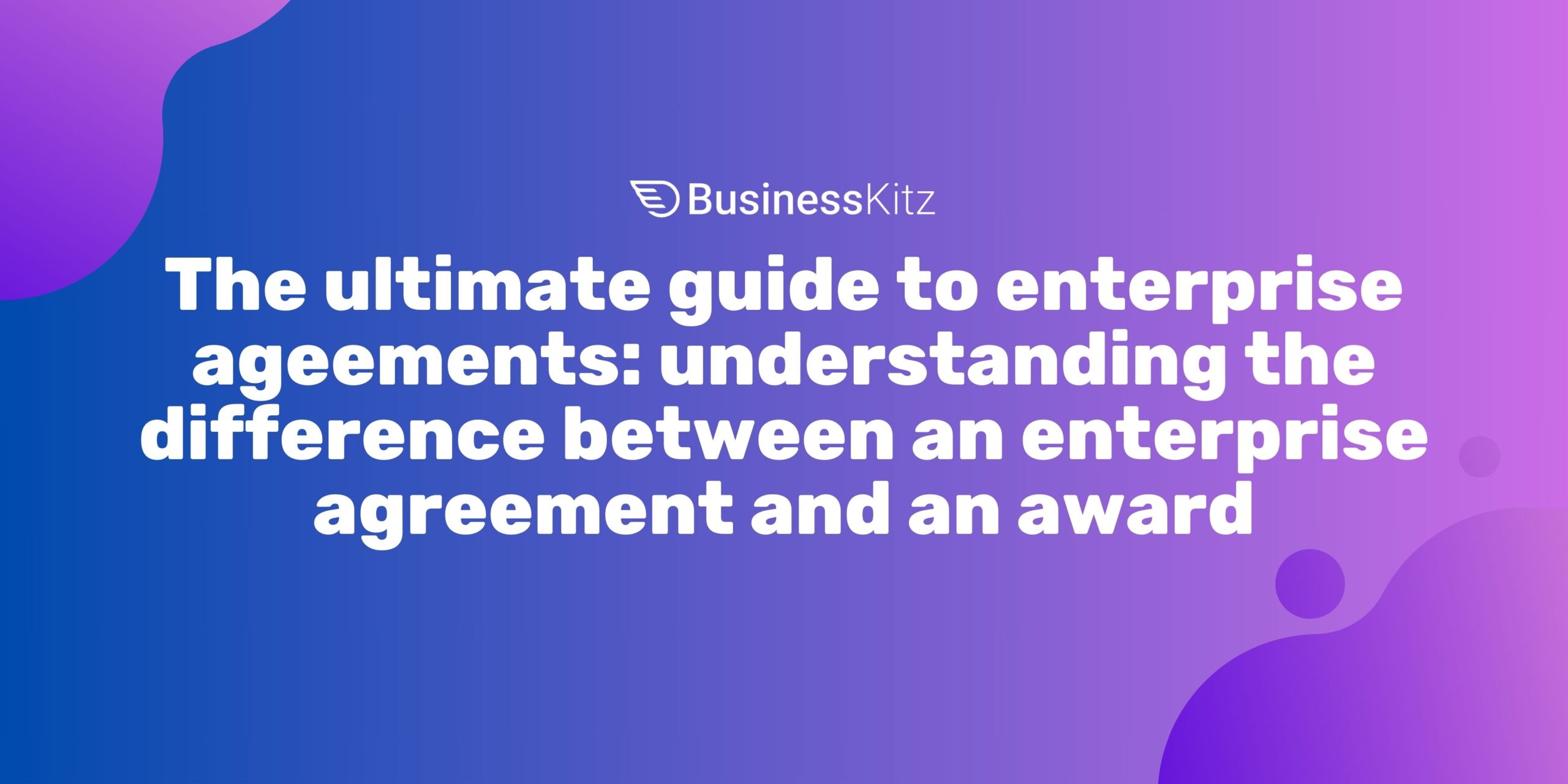
We've helped businesses save $55m with our all-in-one platform. Get instant access to this template and 115+ others, plus AI-powered document creation, starting completely free.
Businesses use enterprise agreements to set clear workplace conditions with employees. A well-structured agreement helps businesses attract skilled workers and improve retention. Understanding how to create, negotiate and manage agreements is key to building a fair and productive workplace.[ez-toc]
Enterprise agreements set workplace conditions between employers and employees. They provide wages, leave entitlements and other benefits beyond the minimum award. Businesses can customise terms to suit their needs while ensuring fair pay and conditions. The Fair Work Commission reviews agreements to ensure compliance. Strong agreements help attract talent, improve retention and create better workplaces.
Enterprise agreements set workplace conditions for employees. They offer tailored terms beyond the minimum standards in modern awards.
Enterprise agreements come in three main types. Each serves a different purpose based on the workplace and industry.1. Single-enterprise agreements
2. Multi-enterprise agreements
3. Greenfields agreements
Enterprise agreements must include conditions that improve on the minimum award entitlements. The Fair Work Commission assesses agreements before they are registered.1. Pay and conditions
2. Working hours and leave
3. Dispute resolution
4. BOOT (Better Off Overall Test)
Enterprise agreements and modern awards both set workplace conditions, but they have key differences.FeatureEnterprise agreementModern awardCoverageSpecific to a business or group of businessesCovers an entire industry or occupationFlexibilityCustomised for the workplaceStandard conditions for all employeesApproval processRequires Fair Work Commission approvalSet by the Fair Work CommissionPay and conditionsMust be better than the modern awardSets the minimum legal requirementsBargaining processNegotiated by employers, employees and unionsNo negotiation requiredEnterprise agreements provide flexibility while ensuring fair conditions for employees. Employers should review their industry needs before choosing an agreement.Utilise Business Kitz to streamline your employee and contract management processes.

Enterprise agreements set workplace conditions and must follow legal requirements. Only certain parties can negotiate and apply for them.
The following parties can negotiate an enterprise agreement:
Each party must follow fair bargaining rules set by the Fair Work Commission.
Enterprise bargaining ensures fair agreements that meet legal standards. Employers and employees must follow these steps:
Many believe only unions can negotiate enterprise agreements. This is not true. Employees can represent themselves or choose another bargaining representative.Some think modern awards do not apply once an enterprise agreement is in place. This is also incorrect. An agreement must provide better conditions than the relevant award.Employers and employees should learn their rights before starting negotiations. Understanding the process helps make sure that agreements are made fairly.
Creating an enterprise agreement involves several key steps. Employers and employees must follow legal requirements to ensure fair terms.
Before starting negotiations, employers should:
Proper preparation helps avoid delays and legal issues later.
Enterprise bargaining allows employers, employees and unions to discuss workplace conditions. All parties must negotiate in good faith, meaning they must:
Negotiations should focus on fair wages, work conditions and industry standards.
Once the terms are agreed upon, the employer must:
This step ensures employees make an informed decision before voting.
Employees must vote on the final agreement. The voting process must be:
If the majority approves, the agreement moves to the next stage.
The employer must submit the agreement to the Fair Work Commission. The commission checks that:
If approved, the agreement is legally binding and replaces the award.
Many agreements fail because they:
Employers should review their agreement carefully before submission. Getting legal advice can help avoid costly mistakes.

Managing an enterprise agreement requires the right tools and resources. Employers must ensure compliance, streamline processes and meet legal standards.
The Australian government provides several resources to help businesses create and manage enterprise agreements. These include:
Using these resources helps businesses avoid errors and meet legal requirements.
Many businesses use digital tools to manage enterprise agreements efficiently. These solutions improve compliance and document security.1. Contract management softwareSecure digital platforms help businesses create, sign and store agreements. Business Kitz offers a simple solution for:
2. HR and legal advisory servicesProfessional HR and legal experts help businesses:
Using the right tools and resources helps businesses create strong, legally sound agreements. Employers should review available options to find the best fit for their needs.
Enterprise agreements set workplace conditions beyond the minimum award. They help employees gain better pay, benefits and work-life balance.
Enterprise agreements must improve conditions compared to the relevant award. They provide flexibility while ensuring employees remain better off overall.1. Wages and pay structures
2. Leave entitlements and flexibility
3. Additional perks and incentives
A private healthcare provider struggled with high staff turnover. Nurses and support staff left for better pay and conditions in other workplaces. The business introduced an enterprise agreement to improve employee entitlements.Key changes included:
After one year, staff retention improved by 30%. Employees felt valued and engaged, reducing recruitment costs for the business.A well-structured enterprise agreement benefits both employers and employees. Businesses should review industry standards and negotiate fair conditions to attract and retain talent.

Enterprise agreements must follow workplace laws. Employers and employees must ensure agreements comply with the Fair Work Act and other legal requirements. If disputes arise, clear processes help resolve them fairly.
Employers must follow all terms in an enterprise agreement. Compliance includes:
The Fair Work Ombudsman provides resources to help businesses comply. Employers should regularly review agreements to ensure they meet legal standards.
A breach occurs when an employer or employee does not follow the agreement. Common breaches include:
If a breach happens, the affected party should:
Enterprise agreements must include a dispute resolution process. The Fair Work Commission provides:
Employers and employees should use these tools to resolve issues quickly. A strong dispute resolution process helps maintain a fair and productive workplace.
Enterprise agreements apply to businesses that want to set workplace conditions beyond the minimum award. They allow employers to tailor pay, leave and flexibility to suit a specific business. The Fair Work Commission ensures agreements meet legal standards before approval.
You can find enterprise agreements on the website of the Fair Work Commission. The site provides agreements and other registered agreements across different industries and sectors. Employers and employees can search for agreements that match their workplace needs.
An enterprise agreement must ensure employees are better off compared to the relevant award. It must meet or exceed the minimum wages set by Fair Work Australia. The Better Off Overall Test (BOOT) ensures employees receive fair pay and entitlements.
An award sets minimum pay and conditions for a whole industry. Enterprise agreements and other registered agreements allow businesses to establish tailored terms beyond the award. While an award will apply automatically, an agreement must be negotiated and approved.
The commission supports agreement-making by reviewing and approving agreements. It ensures agreements follow workplace laws and do not disadvantage employees. Employers and their representatives must submit agreements to the commission for assessment.
If a dispute arises, employees and their representatives should follow the agreement’s resolution process. If no resolution is reached, the Fair Work Commission can mediate. Employers must also follow rules set by the Fair Work Act.
Yes, agreements vary based on business needs. Fair Work offers a collaborative approaches program that helps businesses negotiate fair terms with employees. Employers should ensure agreements reflect the conditions of their employment while meeting legal standards.
Employers must notify employees, negotiate terms and conditions, and draft the agreement. Employees then vote on the final terms. If approved, the agreement is sent to the Fair Work Commission for review.
Enterprise bargaining allows employees to negotiate better wages and flexibility than a traditional award. It ensures employees benefit through higher pay, improved leave entitlements and workplace culture changes.
To learn more about enterprise agreements and other registered agreements, visit the website at Fair Work Commission. The site offers guidance, checklists and templates for agreement-making. If you need help, please contact a workplace relations professional for advice.
The collaborative approaches program supports fair negotiations between employers and employees. It helps businesses establish strong agreements that meet industry standards. The program also rules on fair conditions of employment.
If an employer does not meet the entitlements or obligations in an agreement, employees may raise concerns. Employees and their representatives may report breaches to the Fair Work Ombudsman or Fair Work Commission.
Enterprise agreements help create a positive workplace culture. They encourage fair pay, flexible work and professional development.
The Fair Work Commission provides a centre for agreement-making resources. Businesses can access checklists, guidelines and case studies to help establish fair agreements. The commission also offers a page for related information on compliance.
To establish an enterprise agreement, a business must follow legal steps. These include employee consultation, fair negotiation and submission to the Fair Work Commission. A variation to an existing agreement may also be submitted for approval.
For related information on enterprise agreements and compliance, visit the Fair Work Commission website. Employers can also contact legal advisors or HR professionals for guidance.
Enterprise agreements give businesses and employees more control over workplace conditions. They offer flexibility, improve job satisfaction and help businesses stay competitive.
Managing agreements can be complex, but the right tools make the process easier. Business Kitz provides digital solutions for creating, signing and storing agreements securely.Explore Business Kitz today and sign up for a free account to simplify enterprise agreement management and support compliance.Disclaimer: This content is intended to be used for educational and informational purposes only. Business Kitz does not offer legal advice and cannot guarantee the accuracy, reliability, or suitability of its website content for a particular purpose. We encourage you to seek professional advice from a licensed professional and verify statements before relying on them. We are not responsible for any legal actions or decisions made based on the information provided on our website.Unless expressly stated otherwise, all content, materials, text, images, videos and other media on this website and its contents are the property of their respective copyright owners.
Copyright © 2025 Business Kitz 14312161